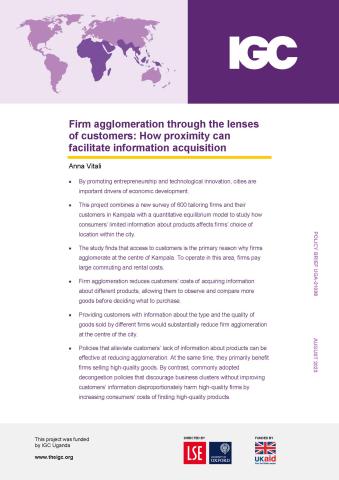Firm agglomeration through the lenses of customers: How proximity can facilitate information acquisition
-
Vitali Policy brief August 2023
PDF document • 322.48 KB
- By promoting entrepreneurship and technological innovation, cities are important drivers of economic development.
- This project combines a new survey of 600 tailoring firms and their customers in Kampala with a quantitative equilibrium model to study how consumers’ limited information about products affects firms’ choice of location within the city.
- The study finds that access to customers is the primary reason why firms agglomerate at the centre of Kampala. To operate in this area, firms pay large commuting and rental costs.
- Firm agglomeration reduces customers’ costs of acquiring information about different products, allowing them to observe and compare more goods before deciding what to purchase.
- Providing customers with information about the type and the quality of goods sold by different firms would substantially reduce firm agglomeration at the centre of the city.
- Policies that alleviate customers’ lack of information about products can be effective at reducing agglomeration. At the same time, they primarily benefit firms selling high-quality goods. By contrast, commonly adopted decongestion policies that discourage business clusters without improving customers’ information disproportionately harm high-quality firms by increasing consumers' costs of finding high-quality products.



